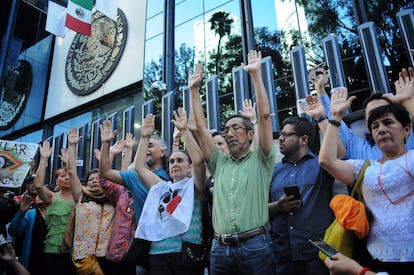Journalists and human rights defenders during a demonstration against espionage in June 2017 Diego Simón Sánchez / CUARTOSCURO
The tip of the iceberg on the scope of the government of Mexico's spyware purchases is starting to get bigger. The Ministry of Security and Citizen Protection (SSPC) has reported this Wednesday that it has found 31 contracts in which the company that sold the Pegasus malware provided its services through front companies to government agencies. The contracts were made between 2008 and 2018, but most of them were signed during the last years of Felipe Calderón's administration (2006-2012). All the transactions recorded so far were made under various concepts, such as maintenance services or uniform purchases, to camouflage the acquisition of a computer program that infiltrates mobile phones to spy on journalists, activists and political opponents.
Among its digital files, the SSPC has managed to unearth a list of purchases with public funds with seven different companies linked to the Tech Bull Group, the entity that owns the right to distribute the Pegasus system, and which are related to NSO Group Technologies, the creators of spyware.
The analyzes of the Mexican authorities place the final amount of the purchases discovered so far at more than 1,970 million pesos from the public coffers, just over 61 million dollars.
The transactions uncovered by the SSPC are the only ones known to date, but the authorities' investigations have yet to confirm the existence of more contracts with public entities and the private companies that also acquired the software are known.
More information
The company that operated Pegasus in Mexico signed contracts with the Army to purchase toys and oil
The Federal Police acquired 16 different contracts with two front companies: KBH Aviation SA and Comercializadora de Soluciones Integrales Mecale.
Both registered transactions during the last two years of the Calderón Administration under maintenance services for electronic equipment and computer security and intelligence systems.
The Federal Police, which was replaced by the National Guard with the arrival of Andrés Manuel López Obrador to the National Palace, accumulates the highest number of contracts of the total.
However, there is no breakdown of the total contract amounts.
In the last year of the Peña Nieto administration, the Ministry of the Interior - on which the Federal Police previously depended - signed two contracts with the companies Proyecto Semilla and with Textile Articles, Equipment and MV Accessories. Purchases with the former were made under the concept of advertising and diffusion on cinema screens and street furniture for the 90th Anniversary campaign of the Federal Police. The second figure as a provider of an open contract to purchase uniforms.
The Prevention and Social Adaptation unit that regulates penitentiary policy at the national level, has in its records the contracts for the largest amount of money. Of the seven transactions disclosed with four different companies, one stands out for a value of 43.5 million dollars (almost 870 million pesos) in July 2012 for the acquisition of closed television circuits from the company BSD Security Systems. This company still had the contracts in force during the first two years of López Obrador's mandate, when WhatsApp denounced in court that the Israeli firm that created Pegasus infiltrated its systems to spy on the phones of its users through a video call.
The Federal Protection Service acquired two contracts with a single company, the same company that supposedly provided the uniforms to the Ministry of the Interior: Textile Articles, MV Equipment and Accessories.
The transactions for official clothing and boots were carried out by direct award at the request of the General Directorate of Security Services during the Peña Nieto administration.
Finally, the National Intelligence Center, which was previously the Cisen unit, adds four more contracts to the list with VME Projects and Designs.
Between 2016 and 2017, purchases of its “technological infrastructure update and maintenance services” were registered for a total amount of 414.4 million pesos (almost 21 million dollars).
The total figure for the diversion of public funds for espionage amounts to more than 1,970 million pesos, as calculated by the SSPC. The estimates of the Financial Intelligence Unit of the Ministry of Finance put the economic impact of these purchases at 6,000 million pesos of public money, just over 300 million dollars. The amount could be significantly higher if there are public contracts in other agencies, in addition to acquisitions of private companies.
Pegasus, one of the most sophisticated cyber espionage software that exists, was created under the pretext of governments fighting for national security, fighting terrorism or drug trafficking.
But the true purpose was questioned when a group of Mexican journalists and activists accused the government of their country for having been victims of espionage.
Among them were a journalist who had investigated a Peña Nieto conflict of interest and a group of lawyers and activists who had fought for the government to impose a tax on soft drinks.
Although the software was used by international entities around the globe, in no other country in the world did Pegasus clients have as many objectives as in Mexico.
Subscribe here
to the
newsletter
of EL PAÍS México and receive all the informative keys of the current situation of this country

